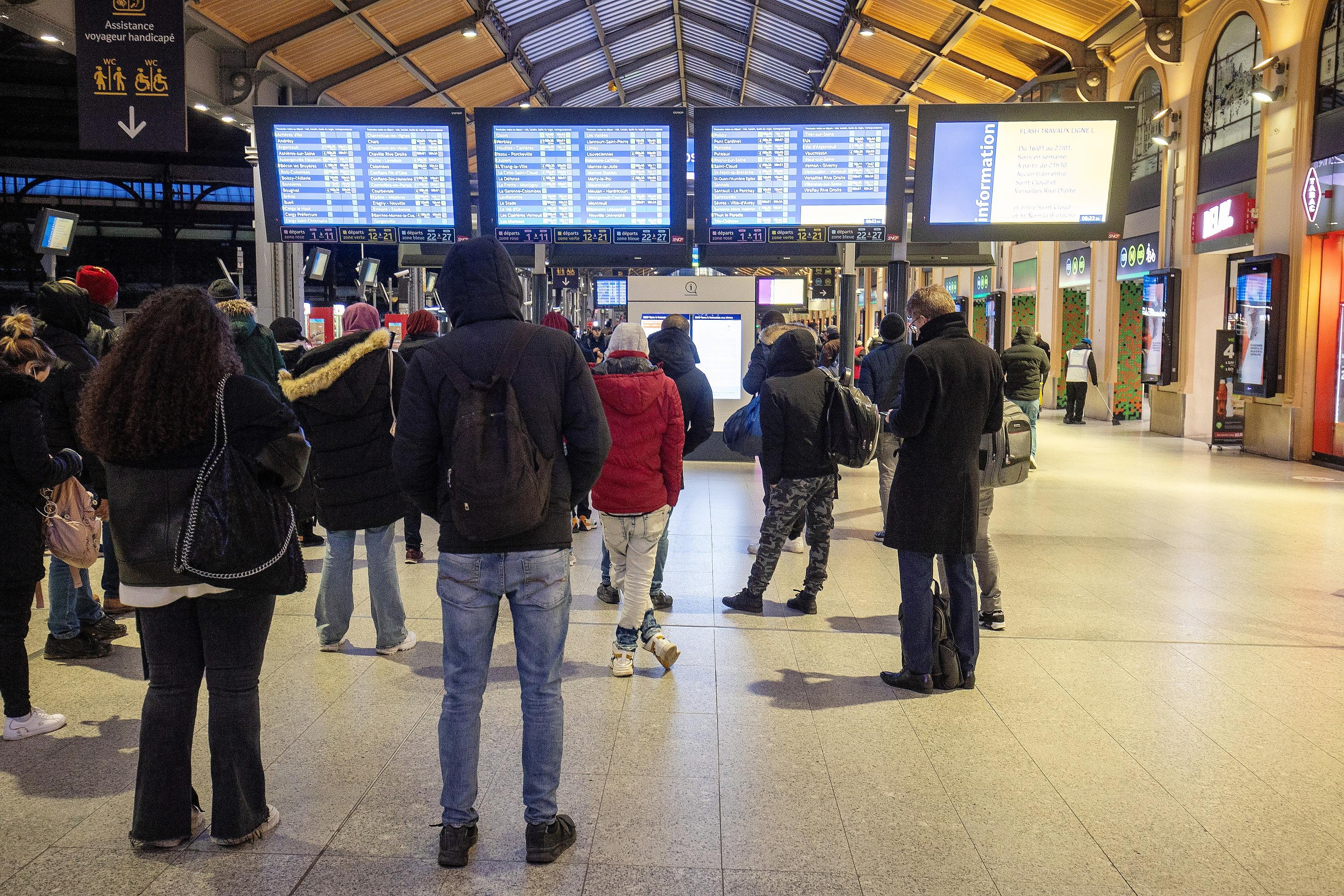The strike by SNCF controllers during the February holiday chase, which left hundreds of thousands of passengers on the platform, was the straw that broke the camel's back. It echoed the social movement of Christmas 2022, where customers were also deprived of TGV. Even the countless surprise stoppages in everyday transport which cause delays at the office or workshop for their users. “Before, the social partners in transport started by negotiating and if the discussions were unsuccessful, it led to a strike. There, coordinations or movements born on Facebook strike first to influence the negotiations,” laments Hervé Marseille, centrist Union senator (Hauts-de-Seine).
To put an end to these social movements which bring France to a standstill at sensitive times, the member of the High Assembly tabled, on February 14, a bill aimed at regulating the right to strike in public transport (excluding plane). A text which will be examined this Wednesday April 3 in the Sustainable Development Committee, before arriving in public session on April 9 afternoon. “Since 1947, there has not been a year without a day of strike at the SNCF,” sighs Philippe Tabarot, senator LR (Alpes-Maritimes), rapporteur of this bill. This desire to move forward on the subject also resonates with the approaching deadline of the Paris Olympic Games: the CGT-RATP has filed a strike notice from February 5, 2024 at 7 p.m. to Monday September 9, 2024 at 8 hours.
Concretely, the text submitted to the Senate is inspired by the Italian situation where strikes in transport are prohibited during certain holiday periods (Christmas, Easter, summer, etc.), or the three days which coincide, precede or follow major elections. national… But French senators are aware of making progress on a sensitive subject: in France, the right to strike is constitutional. To avoid the wrath of the Constitutional Council, Philippe Tabarot rounded the corners. And it is his version which will be submitted to the vote of the sustainable development committee in the Senate, not that of Hervé Marseille, more maximalist.
Also read Plane, train: passenger rights in the event of a strike, delay or cancellation
The main measure would consist of protecting thirty days during which the strike would be prohibited. “The big departure days, Christmas, Easter, July 14, August 15… would be affected,” indicates Philippe Tabarot. And this during peak hours, for example between 7 a.m. and 9 a.m. and 5 p.m. and 8 p.m. » This limitation of the right to strike would only concern those who participate in the operation of trains, metros, buses or trams (drivers, controllers, etc.), not administrative staff. Of these thirty days without a peak hour strike, there could not be more than seven in a row. There is therefore no question of banning social movements from July 14 to July 31.
Setting these days would be the subject of discussions for a month between professional federations, unions and the Ministry of Transport. At the end of these negotiations, at the beginning of the fourth quarter, a decree would be published, recording the list of fixed days. Those who do not respect this text could be subject to disciplinary sanctions as a warning; they would not incur criminal sanctions (fine, imprisonment, etc.).
Other measures, less symbolic but which are important, appear in this bill. “The dormant notices, some of which are filed until 2045, would fall after a month if at least two agents have not taken advantage of them to strike,” argues Philippe Tabarot. Likewise, to allow businesses and customers to better organize themselves, the notice period for declaring oneself a striker would be 72 hours before the movement, compared to 48 hours today. Likewise, if 59-minute strikes (less than an hour without salary deduction) would remain legal, they would be possible when taking up a shift, but not in the middle of the day where the reassignment of a striking agent is always complicated .
In the Senate where the center and the traditional right have a majority, the text has a very good chance of being adopted. In the National Assembly, however, it will be another matter. Not sure he will get government support. In any case, he will not have that of the Minister of Transport, Patrice Vergriete, who declared at the end of February: “I do not think there is a need to reform the right to strike today. If there were periods, we would have to choose them and what do we prioritize? Holidays ? Or the daily life of the French? I prefer to call for responsibility. »

 Poland, big winner of European enlargement
Poland, big winner of European enlargement In Israel, step-by-step negotiations for a ceasefire in the Gaza Strip
In Israel, step-by-step negotiations for a ceasefire in the Gaza Strip BBVA ADRs fall almost 2% on Wall Street
BBVA ADRs fall almost 2% on Wall Street Ukraine has lost 10 million inhabitants since 2001... and could lose as many by 2050
Ukraine has lost 10 million inhabitants since 2001... and could lose as many by 2050 Sánchez cancels his agenda and considers resigning: "I need to stop and reflect"
Sánchez cancels his agenda and considers resigning: "I need to stop and reflect" The Federal Committee of the PSOE interrupts the event to take to the streets with the militants
The Federal Committee of the PSOE interrupts the event to take to the streets with the militants Repsol: "We want to lead generative AI to guarantee its benefits and avoid risks"
Repsol: "We want to lead generative AI to guarantee its benefits and avoid risks" Osteoarthritis: an innovation to improve its management
Osteoarthritis: an innovation to improve its management Ukraine gets a spokesperson generated by artificial intelligence
Ukraine gets a spokesperson generated by artificial intelligence The French will take advantage of the May bridges to explore France
The French will take advantage of the May bridges to explore France Organic flour contaminated by a recalled toxic plant
Organic flour contaminated by a recalled toxic plant 2024 Olympics: Parisian garbage collectors have filed a strike notice
2024 Olympics: Parisian garbage collectors have filed a strike notice Death of Paul Auster: Actes Sud says he is “lucky” to have been his publisher in France
Death of Paul Auster: Actes Sud says he is “lucky” to have been his publisher in France Lang Lang, the most French of Chinese pianists
Lang Lang, the most French of Chinese pianists Author of the “New York Trilogy”, American novelist Paul Auster has died at the age of 77
Author of the “New York Trilogy”, American novelist Paul Auster has died at the age of 77 To the End of the World, The Stolen Painting, Border Line... Films to watch this week
To the End of the World, The Stolen Painting, Border Line... Films to watch this week Omoda 7, another Chinese car that could be manufactured in Spain
Omoda 7, another Chinese car that could be manufactured in Spain BYD chooses CA Auto Bank as financial partner in Spain
BYD chooses CA Auto Bank as financial partner in Spain Tesla and Baidu sign key agreement to boost development of autonomous driving
Tesla and Baidu sign key agreement to boost development of autonomous driving Skoda Kodiaq 2024: a 'beast' plug-in hybrid SUV
Skoda Kodiaq 2024: a 'beast' plug-in hybrid SUV The home mortgage firm rises 3.8% in February and the average interest moderates to 3.33%
The home mortgage firm rises 3.8% in February and the average interest moderates to 3.33% This is how housing prices have changed in Spain in the last decade
This is how housing prices have changed in Spain in the last decade The home mortgage firm drops 10% in January and interest soars to 3.46%
The home mortgage firm drops 10% in January and interest soars to 3.46% The jewel of the Rocío de Nagüeles urbanization: a dream villa in Marbella
The jewel of the Rocío de Nagüeles urbanization: a dream villa in Marbella Europeans: a senior official on the National Rally list
Europeans: a senior official on the National Rally list Blockade of Sciences Po: the right denounces a “drift”, the government charges the rebels
Blockade of Sciences Po: the right denounces a “drift”, the government charges the rebels Even on a mission for NATO, the Charles-de-Gaulle remains under French control, Lecornu responds to Mélenchon
Even on a mission for NATO, the Charles-de-Gaulle remains under French control, Lecornu responds to Mélenchon “Deadly Europe”, “economic decline”, immigration… What to remember from Emmanuel Macron’s speech at the Sorbonne
“Deadly Europe”, “economic decline”, immigration… What to remember from Emmanuel Macron’s speech at the Sorbonne These French cities that will boycott the World Cup in Qatar
These French cities that will boycott the World Cup in Qatar Top 14: Fijian hooker Narisia leaves Racing 92 and signs for Oyonnax
Top 14: Fijian hooker Narisia leaves Racing 92 and signs for Oyonnax Europa League: Jean-Louis Gasset is “wary” of Atalanta, an “atypical team”
Europa League: Jean-Louis Gasset is “wary” of Atalanta, an “atypical team” Europa League: “I don’t believe it…”, Gasset jokes about Aubameyang’s age
Europa League: “I don’t believe it…”, Gasset jokes about Aubameyang’s age Foot: Rupture of the cruciate ligaments for Sergino Dest (PSV), absent until 2025
Foot: Rupture of the cruciate ligaments for Sergino Dest (PSV), absent until 2025
















